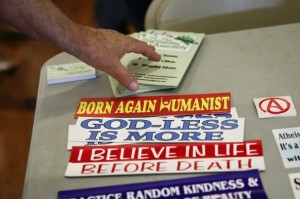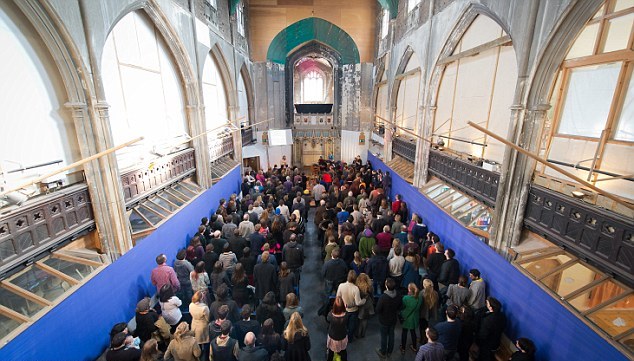Atheist ‘mega-churches’ are springing up in Britain and America, with attendees “bound by their belief in non-belief.” Apparently, you can take God out of the church, but you can’t take church out of the godless.
 The motto of the Los Angeles Sunday Assembly of Atheists is: “Live Better, Help Often, Wonder More.” One wonders…is that wonder as in question religion, wonder about anything beyond the mind of man, or wonder as awe?
The motto of the Los Angeles Sunday Assembly of Atheists is: “Live Better, Help Often, Wonder More.” One wonders…is that wonder as in question religion, wonder about anything beyond the mind of man, or wonder as awe?
Whichever it is, packing hundreds of people into a church, including families with small children, “for more than an hour of rousing music, an inspirational talk and some quiet reflection,” sans God, is a distinction without a difference. Organized atheism is no different than organized religion.
Actively believing in God or actively disbelieving in God are both within the context and conditioning of belief. Active agnosticism is another kettle of fish altogether—not to be confused with loaves and fishes, or fish out of water, like churchgoing atheists.
Emptiness and ennui feed both active atheism and passive agnosticism. Whereas active atheism asserts non-belief in anything sacred, passive agnosticism is apathetic to the question of whether something that can be called God exists.
An inward dimension, not just the rational mind plus some ‘community,’ is essential to human beings. Active agnosticism, on the other hand, negates belief in a God or gods, and perennially leaves open the question of whether there is something numinous. Eschewing either belief or disbelief, while withholding conclusions and upholding questioning, keeps one inwardly alive.
“Atheists seek the camaraderie of a congregation without religion or ritual,” the story goes. From their perspective, they want the pack without the rack; from a believer’s perspective (which I’m not), atheists like the money without the honey.
The intention of congregationalist atheists is to “find a new way to meet likeminded people, engage in the community and make their presence more visible in a landscape dominated by faith.” It all falls under their proselytizing message: ‘You can be a good and patriotic person without believing in God.’
It’s all quite risible really, especially when the inspiration for the founder of the movement, Sanderson Jones, came from listening to Christmas carols six years ago.
“There was so much about it that I loved,” he said, “but it’s a shame because at the heart of it, it’s something I don’t believe in. If you think about church, there’s very little that’s bad. It’s singing awesome songs, hearing interesting talks, thinking about improving yourself and helping other people — and doing that in a community with wonderful relationships. What part of that is not to like?”
Plenty, if you prefer awe over awesome.
The problem is that neither monotheists nor the nonothesists have an inward life. Since theology has gone the way of astrology, the  monotheists have the wineskins without the wine, while nonotheists have the corn (the movement was started by two British comedians, as the above quote by one of them attests), but are still blowing the horn.
monotheists have the wineskins without the wine, while nonotheists have the corn (the movement was started by two British comedians, as the above quote by one of them attests), but are still blowing the horn.
Must atheism follow deism like night follows day (not that any religion ever shed much light), or is there another way altogether? In the end, are humans merely social animals with rational capabilities, exercised with increasing irrationality? No, human beings are spiritual creatures, with rational minds rightly used to doubt, replicate and deepen the veracity of religious experience.
Beliefs, for or against the existence of God, are made by the mind of man. Is the mind of man the highest thing, indeed the only thing? Beyond the absurdity of congregationalist atheists, making a religion of rationalism simply doesn’t cut it.
Of course, the very existence of atheists, especially in any numbers, threatens the bejesus out of Christians. At least atheists don’t attack believers for their beliefs; they just want their belief in unbelief to be recognized as equally valid.
However nothing demonstrates the similarity between secularists and believers more than a statement by a professor of secular studies in Claremont California, Phil Zuckerman: “In the U.S., there’s a little bit of a feeling that if you’re not religious, you’re not patriotic.” That’s right, the religion almost everyone can agree on in America, besides God spelled backwards, is patriotism, and atheists are hell bent on showing they can be just as patriotic as hell bent Christians.
Atheism was the state religion of the Soviet Union, and when the USSR fell, the majority of people flipped back into being believers and followers of the Russian Orthodox Church. It’s one of the many ironies of history that with the collapse of the US, atheism is gaining many adherents (even as people give lip service to being ‘spiritual but not religious,’ whatever that means).
Thought separates and divides, imagines and projects. Dualism is wired into us, since it’s in the very nature of ‘higher thought.’ Therefore beliefs, for or against God, have nothing to do with the numinous.
The brain generates the mind-as-thought, but the mind-without-thought is infinitely greater than the brain. For the brain to be aware of and in contact with the infinite energy of intelligence, thought must be completely still. No method or technique can make the mind still—just as no belief system can bring the sacred, just stand in the way of it.
The brain can only observe thought into stillness, without the effort of the self or the division of the observer. Then there is something beyond words, beyond beliefs and conclusions, whether affirmational as religions or incredulous as atheism.
Call that whatever you like, but venerating the mind of man, whether as a projection like Christians and all organized religions do, or directly as atheists do, demonstrates arrested development inwardly.
Martin LeFevre

